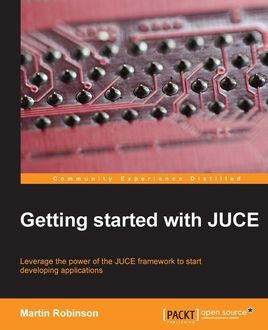We use cookies to improve the Bookmate website experience and our recommendations.
To learn more, please read our Cookie Policy.
To learn more, please read our Cookie Policy.
Accept All Cookies
Cookie Settings
In DetailThere are a number of frameworks available for developing cross-platform applications. JUCE achieves this with a combination of consistency, ease-of-use, and breadth of functionality. JUCE is a C++ toolkit for building cross-platform applications on PC, Mac, Linux, iOS, and Android. It encourages you to write consistent code and is particularly good for complex, customized GUIs and audio/midi processing; it also includes a vast range of classes to help with all your day-to-day programming tasks.
Getting Started with JUCE is a practical, hands-on guide to developing applications using JUCE which will help you get started with many of the core aspects of the JUCE library. The book guides you through the installation of JUCE and covers the structure of the source code tree including some of the useful tools available for creating JUCE projects.
Getting Started with JUCE will guide you through how to use the JUCE library, from the installation of basic tools to developing examples using many of its classes. It will take you through a series of practical examples that show you how to create user interfaces, illustrating the key features.
You will also learn how to deal with files, text strings, and other fundamental data using the JUCE library. In particular, you will learn how to create user interfaces both using code and using the Introjucer tool to layout and configure user interface functionality. You will also manipulate image and audio data and learn how to read and write common media file formats. With this book, you will learn everything you need to know to understand some of the additional helpful utilities offered by JUCE and how to use the JUCE documentation to get started with such classes.
ApproachThis book is a fast-paced, practical guide full of step-by-step examples which are easy to follow and implement.
Who this book is forThis book is for programmers with a basic grasp of C++. The examples start at a basic level, making few assumptions beyond fundamental C++ concepts. Those without any experience with C++ should be able to follow and construct the examples, although you may need further support to understand the fundamental concepts.
Getting Started with JUCE is a practical, hands-on guide to developing applications using JUCE which will help you get started with many of the core aspects of the JUCE library. The book guides you through the installation of JUCE and covers the structure of the source code tree including some of the useful tools available for creating JUCE projects.
Getting Started with JUCE will guide you through how to use the JUCE library, from the installation of basic tools to developing examples using many of its classes. It will take you through a series of practical examples that show you how to create user interfaces, illustrating the key features.
You will also learn how to deal with files, text strings, and other fundamental data using the JUCE library. In particular, you will learn how to create user interfaces both using code and using the Introjucer tool to layout and configure user interface functionality. You will also manipulate image and audio data and learn how to read and write common media file formats. With this book, you will learn everything you need to know to understand some of the additional helpful utilities offered by JUCE and how to use the JUCE documentation to get started with such classes.
ApproachThis book is a fast-paced, practical guide full of step-by-step examples which are easy to follow and implement.
Who this book is forThis book is for programmers with a basic grasp of C++. The examples start at a basic level, making few assumptions beyond fundamental C++ concepts. Those without any experience with C++ should be able to follow and construct the examples, although you may need further support to understand the fundamental concepts.
more
176 printed pages
- Publication year
- 2013
- Publisher
- Packt Publishing
Have you already read it? How did you like it?
👍👎
fb2epub
Drag & drop your files
(not more than 5 at once)


